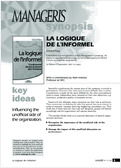Ancestral instincts and behavior in the workplace

In the era of information technologies, our brains still function like they did in the Stone Age! Inspired by evolutionary psychology, this book sheds interesting light on organizational behavior.
Back in the 19th century, Darwin created quite a stir when he declared that man descended from the apes. Scientists have since proven the validity of this theory, by demonstrating natural selection and explaining the phenomenon of genetic mutation. Psychologists applied the research on the evolution of the species to the evolution of the human mind. Their surprising conclusion is that our instincts have not changed much since prehistoric times. The modern era represents only a tiny fraction of the time that man has been evolving on earth. In consequence, our “genetic programming” is more adapted to a semi-nomadic hunter-gatherer culture than to contemporary society.
“Managing the Human Animal” extrapolates this thinking to the world of business. The author identifies a number of deeply embedded human instincts that are often contradicted by companies for no particularly good reason. He therefore dispels several common management myths. We chose to analyze the following topics in particular:
– Emulate the organization of ancestral communities to create efficient structures.
– Recognize the irrational side of company life.
– Beware of the myth of equality of the sexes.
– Understand that information will always circulate informally, and learn to take these unofficial channels into account.
SubscriberSign in
to download
the synopse (8 p.)
VisitorI want to buy
this synopsis (8 p.)
VisitorI want
to subscribe
See also

Decipher the unofficial side of the organization
The functioning of companies is not only dictated by official rules but also through informal phenomena. How can you take this into account in the management of the organization?

Building trust
The level of trust is generally low in business organizations, while it constitutes a real performance challenge. How can you identify the behaviors that will enable you to build trust—or, conversely, that might destroy it?

Co-design: Knowing how to dialogue
In a digital era that forces us to be more agile, open and cooperative, the aptitude for dialogue is an essential condition to innovate and adapt. How can you develop your ability to hold constructive team discussions?
